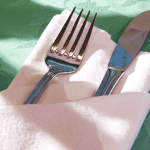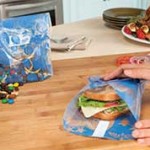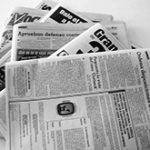10 Tips for Reducing Waste
During this season of giving thanks, in addition to the wonderful things we’re all grateful for—like our health, family and friends—at Norwex, we’re also grateful for our amazing planet as we actively explore how we can better enjoy and help take care of it.
As part of our Mission to improve quality of life, we’re discovering ways to be good to the earth, reduce waste, and save time and money along the way. Here are 10 tips you can use right now to help make a difference in our environment & quality of life.
- Reduce unwanted mail. Take your name off mailing lists for items you no longer need. The average American household receives unsolicited junk mail equal to 1.5 trees every year—more than 100 million trees for all U.S. households combined. It’s been estimated that 250,000 homes could be heated with one day’s supply of junk mail—and Americans receive almost 4 million tons of junk mail every year.
 Use cloth napkins instead of paper towels and napkins. Save money and landfills by using cloth napkins instead of paper. Cloth napkins have the added bonus of looking and feeling nicer, too.
Use cloth napkins instead of paper towels and napkins. Save money and landfills by using cloth napkins instead of paper. Cloth napkins have the added bonus of looking and feeling nicer, too.- Opt for less packaging and avoid disposables. The average American office worker uses about 500 disposable cups every year. Every year, Americans throw away enough paper and plastic cups, forks and spoons to circle the equator 300 times.
- Sell, give away or donate usable clothing and household goods. You’ll be adding extra space to your closets and doing something good for someone else.
- Compost leaves, grass clippings and yard debris. Again, you save landfill space, plus you can use the finished compost to plant flowers and vegetables.
- Copy and print on both sides of the paper. Cutting down on paper waste has two-fold benefits: it reduces the environmental impacts associated with both paper manufacture (including the demands on our forest resources) and as well as paper recycling.
 Pack lunches in reusable materials rather than sandwich bags or foil. Food packaging accounts for nearly 32% of all household waste in North America. The Norwex Out to Lunch duo is perfect for keeping food fresh and it’s a great alternative to plastic bags and wraps.
Pack lunches in reusable materials rather than sandwich bags or foil. Food packaging accounts for nearly 32% of all household waste in North America. The Norwex Out to Lunch duo is perfect for keeping food fresh and it’s a great alternative to plastic bags and wraps.- Use towels, rags and sponges for most cleaning and wipe-ups. They can be washed and reused again and again. Of course, Norwex Microfiber cloths are extra-absorbent, and many contain micro silver, an antibacterial agent that goes to work inside the cloth with self-purification properties to inhibit bacterial odor, mold, and/or mildew growth within the cloth within 24 hours, so that it is ready to use again.
- Consider using safer alternatives to common and potentially hazardous chemicals used in products and processes. Obviously, this is in keeping with the Norwex Mission of improving quality of life by radically reducing the use of chemicals in personal care and cleaning. Fewer chemicals means healthier families and a healthier environment!
 Wrap gifts in recycled or reused wrapping paper or funny papers. Also, remember to save or recycle used wrapping paper. You might even consider giving a gift that doesn’t require much packaging, like something homemade, or even concert tickets or gift certificates.
Wrap gifts in recycled or reused wrapping paper or funny papers. Also, remember to save or recycle used wrapping paper. You might even consider giving a gift that doesn’t require much packaging, like something homemade, or even concert tickets or gift certificates.
Changing our habits is the key to making a lasting difference. And the benefits of reducing waste are huge:
- Waste reduction helps conserve resources for future generations and contributes to a cleaner environment.
- Less air and water pollution is created.
- Fewer landfills means more space for parks and wildlife.
- The energy saved by preventing waste reduces the amount of harmful gases in the air.
- Reusing materials saves money, energy and natural resources.
What other benefits can you think of for reducing the amount of waste you create? Whether you’re at home, on the go, in the office or at school, please take advantage of every opportunity to reduce, reuse and recycle!
http://www.fcgov.com/recycling/pdf/things-you-can-do.pdf
https://www.calrecycle.ca.gov/Reuse/
http://www.cleanair.org/program/waste_and_recycling/recyclenow_philadelphia/waste_and_recycling_facts
http://www.consumer.ftc.gov/articles/0203-language-recycling

 Use cloth napkins instead of paper towels and napkins. Save money and landfills by using cloth napkins instead of paper. Cloth napkins have the added bonus of looking and feeling nicer, too.
Use cloth napkins instead of paper towels and napkins. Save money and landfills by using cloth napkins instead of paper. Cloth napkins have the added bonus of looking and feeling nicer, too. Pack lunches in reusable materials rather than sandwich bags or foil. Food packaging accounts for nearly 32% of all household waste in North America. The Norwex Out to Lunch duo is perfect for keeping food fresh and it’s a great alternative to plastic bags and wraps.
Pack lunches in reusable materials rather than sandwich bags or foil. Food packaging accounts for nearly 32% of all household waste in North America. The Norwex Out to Lunch duo is perfect for keeping food fresh and it’s a great alternative to plastic bags and wraps. Wrap gifts in recycled or reused wrapping paper or funny papers. Also, remember to save or recycle used wrapping paper. You might even consider giving a gift that doesn’t require much packaging, like something homemade, or even concert tickets or gift certificates.
Wrap gifts in recycled or reused wrapping paper or funny papers. Also, remember to save or recycle used wrapping paper. You might even consider giving a gift that doesn’t require much packaging, like something homemade, or even concert tickets or gift certificates.
Great post! Thanks for sharing! <3